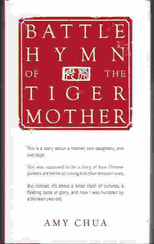Tiger Parent or Alley Cat?
I was having an on-line catch up with a teacher friend the other evening and asked her what her holiday plans were. She explained that they weren’t going away as her daughter was revising for her IGCSEs, so it made sense to stay home. I know for myself the pressures of our kids studying hard and I quipped that she was being a ‘Tiger Mum’, to which she responded more like a ‘Soi Cat Mum’ (alley cat to non-Thais). A laugh out loud moment! Of course, my friend was being neither a tiger parent or an alley cat. Rather, she was being a good mum, creating a positive learning environment for her daughter, in which she could prepare well and fulfil her maximum exam potential. Oh Lordy – I sound like such a sincere teacher-y type some times!

Amy Chua’s ‘Battle Hymn of the Tiger Mother’
The text chat got me thinking, as some years ago I had read Amy Chua’s ‘Battle Hymn of the Tiger Mother’ from which the term Tiger Mum’ is coined. I’m going to extend it to Tiger Parent. For those who don’t know the book it is a brutally honest self-reflection by a Chinese mum about her own parenting style, part of which includes her determination to make her daughters excel, particularly in music. The focus is on Sophia and Lulu who have no time for play-dates or fun, but rather are forced to put all of their energy into learning the violin to a very high standard. When the girls were not being ‘bullied’ into extensive practising, then they were being forced to excel in other areas such as learning Mandarin. It’s only gym and drama that seemed to not really matter!
The book was a good read and made me consider the difference between eastern and western approaches to learning and education. It also got me thinking about whether I am a tiger parent. As an international schoolteacher and mum, whose kids have friends from across the world, it encouraged me to reflect on what are cultural stereotypes and what are, in fact, cultural norms. At the time of reading, I was hesitant about sharing my conclusions. (Is it just me, or does anyone else spend half their lives worrying that they are being unwittingly racist or at least culturally ignorant?) The truth is, though, that I had a lot of sympathy for the Tiger Mum. She had sacrificed her own interests, money and devoted all of her time and energy to her kids, only, to some degree at least, to have her efforts thrown back in her face (eugh – cliché!) when, at the end of the day, she only wanted what was best for her children and for them to be successful (more clichés!) I think though the mum’s definitions of what constituted success was flawed. The reader also questions who owns the success. Was it the girls, the mum herself, or the societal group of which they were a part?

What is Success?
The question of what success means to different cultural groups is a big one. I remember teaching an IB TOK lesson and tiptoeing around the edge of a discussion on ‘what makes success in different cultures?’ I was afraid of exposing myself as an ignorant believer of stereotypes, (rather than the multi-culturally sensitive, open-minded balanced facilitator of stimulating and thought provoking discussion I had been aiming for!) I needn’t have worried; the kids were prepared and eager to discuss the extent to which their own and their parents’ family expectations and values and definition of success were derived from culture and whether this did, in fact, adhere to a cultural stereotype. If you’re wondering … yes … some Asian kids’ parents did have aspirations for them to become engineers or doctors and felt anything less than an A star was a fail and yes.. some Western kids’ parents were simply not bothered, or just wanted them to be ‘happy’! I think though the similarities and differences between views of what constituted success differed enough, within and between cultures, (derived from my very small sample of students) for me to be unable to draw any firm conclusions. How’s that for a bit of ‘fence sitting’ and ‘playing it safe’!?
What I do feel certain of, and I can think of a few teacher friends who will regrettably agree, is that in international school environments, there is no chance of Tiger Mums or Tiger Dads (Tiger parents) becoming extinct any time soon! It is probably fair to say that their existence is not culturally specific, transcends all nationalities and annoys most teachers!
As I was thinking about this blog post I left my eldest daughter in London a message asking her if she could think of examples of where I’d been a ‘tiger mum’. I was afraid she mightn’t have forgiven me for forcing her to attend her swimming group, ironically called Tiger Prawns, far longer than she had expressed any interest whatsoever in doing so – let no daughter of mine be a quitter, not even when they have to compete with tears in their eyes and a tummy bug about to erupt in the pool! She didn’t call back, as she was busy attending to business in her role as Social Secretary of the UCL Swimming Club she adores being part of. I rest my case! She did send a quick text though and told me that I hadn’t been too bad in the ‘Tiger Mum’ area. I haven’t yet asked about the areas I had been bad in, but for now I’m going to let myself off the hook!
If this article has resonated with you then definitely check out this article on Tiger parents. It is superb for looking at well-being of your children.